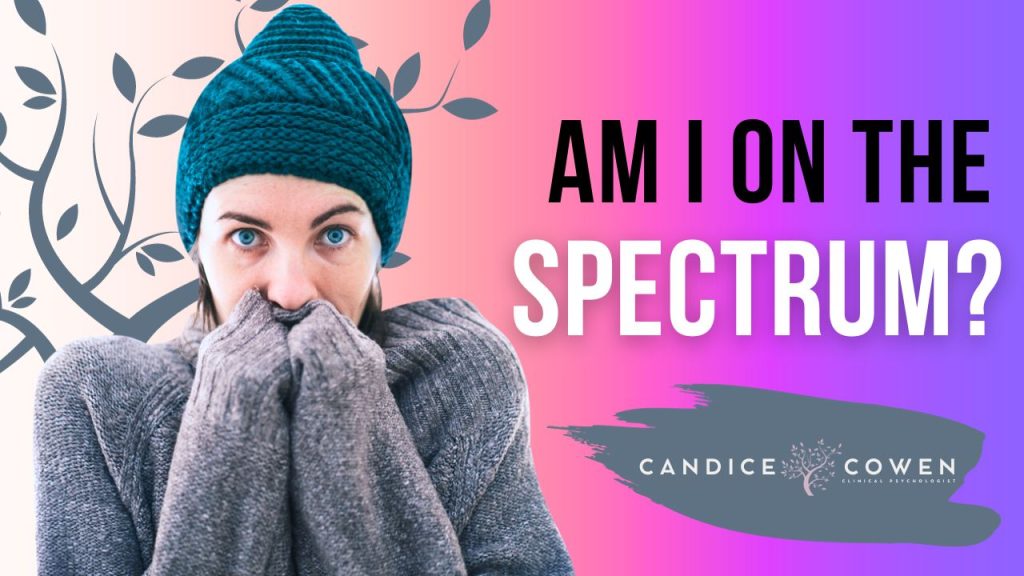Neurodiversity: Exploring the Question
Am I on the Spectrum?
In the realm of mental health and psychology, the question “Am I on the spectrum?” often arises as individuals seek a deeper understanding of their cognitive and behavioural traits. South African Clinical Psychologist, Candice Cowen, delves into this inquiry with a focus on evidence-based insights, steering clear of sensationalism and offering practical perspectives grounded in psychological understanding.
The Nature of the Spectrum
Neurodiversity encompasses a spectrum of neurological variations, with Autism Spectrum Disorder (ASD) being one notable aspect. It’s crucial to recognise that this spectrum is not a linear scale; rather, it represents a diverse range of characteristics, strengths, and challenges that manifest uniquely in each individual.
Recognising Neurodivergent Traits
Individuals exploring the possibility of being on the spectrum often cite certain traits as potential indicators. These may include challenges in social communication, sensory sensitivities, repetitive behaviours, and specific preferences for routine. It’s important to approach these traits with nuance, acknowledging that everyone’s experience is distinct.
Professional Guidance and Assessment
Determining whether one is on the spectrum requires professional assessment and guidance. Clinical Psychologists offer a comprehensive approach to understanding neurodiversity. Through assessments, discussions, and evidence-based methodologies, they provide individuals with a clearer understanding of their cognitive and behavioural patterns.
Dispelling Myths and Misconception
In navigating discussions around neurodiversity, it’s essential to dispel myths and misconceptions. Avoiding overly simplistic narratives, Candice Cowen emphasizes the importance of acknowledging the diversity within the neurodivergent community and steering clear of stereotyping or stigmatization.
Embracing Individuality
Being on the spectrum does not define an individual; rather, it is one facet of their unique identity. Candice Cowen encourages a broader societal understanding that appreciates neurodiversity as a natural variation in human cognition. Celebrating the strengths and addressing the challenges associated with neurodivergence fosters an environment of inclusivity and acceptance.
Moving Forward: Seeking Answers Responsibly
If you are pondering the question “Am I on the spectrum?” We recommend seeking answers responsibly. Engaging in open and honest conversations with a qualified professional allows for a nuanced exploration of one’s cognitive and behavioural patterns, leading to a more accurate and informed understanding.
CONCLUSION
Exploring the question of whether one is on the spectrum requires a balanced and evidence-based approach. With the help of a clinical psychologist, individuals can navigate this inquiry with a commitment to understanding and acknowledging the complexity of neurodiversity. Remember, seeking answers is a thoughtful and proactive step towards self-discovery and a deeper understanding of one’s cognitive and behavioural patterns.
The Impact of Social Media on Mental Health
In the age of digital connectivity, social media has become an integral part of our daily lives. While it offers unprecedented opportunities for communication and information sharing, it also brings...
Read MoreBoundary Setting: Assertively
Dive into "Boundary Setting: Assertively" to explore the fine line between aggression, passive-aggressiveness, and assertiveness. Discover why setting boundaries can be challenging, its paramount importance, and gain valuable insights on...
Read MoreExploring Neurodiversity: “Am I on the Spectrum?”
In the realm of mental health and psychology, the question "Am I on the spectrum?" often arises as individuals seek a deeper understanding of their cognitive and behavioural traits. South...
Read MorePractical ways to improve your mental health in 2024
Stepping into the new year, the emphasis on prioritising mental health gains heightened significance.
Read More



